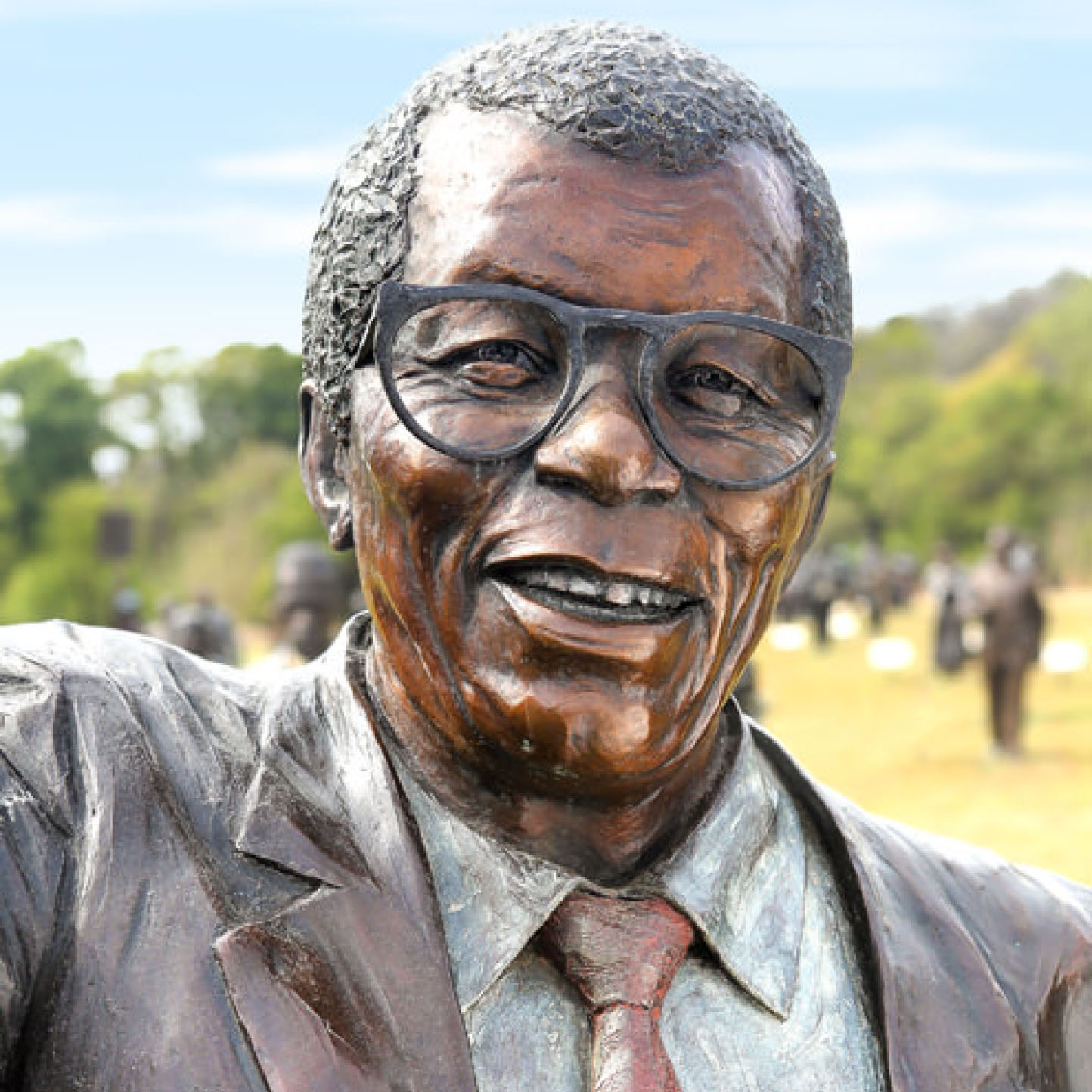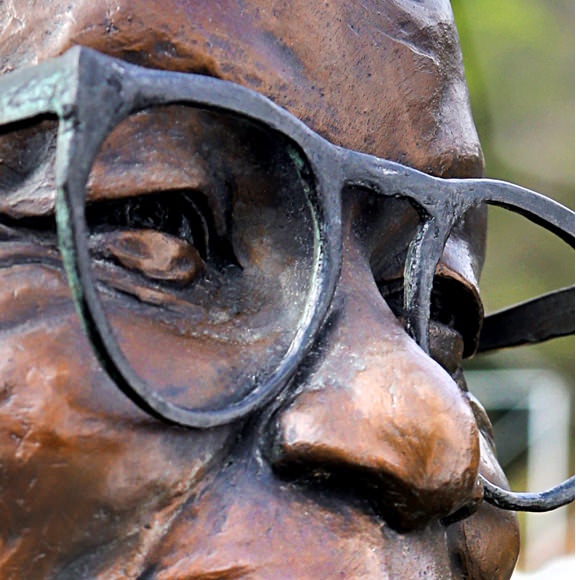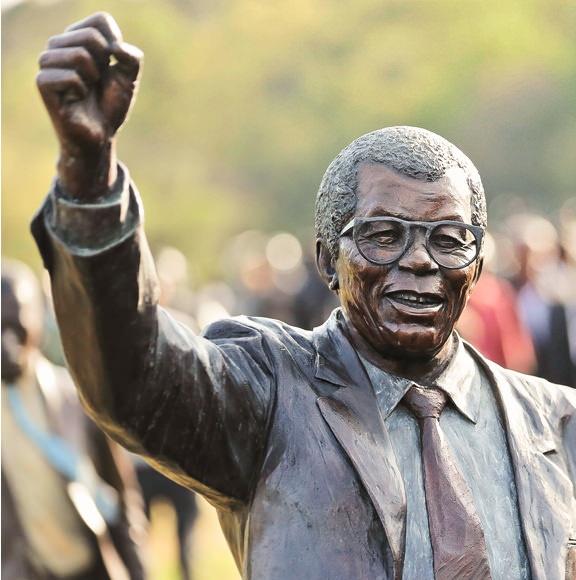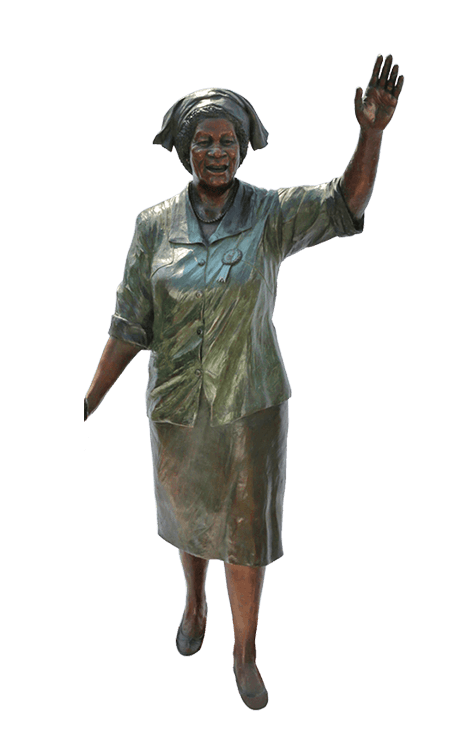


"If joining the ANC changed Walter Sisulu's life, there is no doubt that Walter Sisulu was central in changing the character and direction of the ANC itself."
– African Communist, 2nd Quarter, 1992
Walter Ulyate Max Sisulu
1912 - 2003
Founder member and first Secretary of the ANC Youth League, Secretary General and Deputy President of the ANC
Walter Sisulu was born in the Transkei, in the present-day Eastern Cape, and attended an Anglican missionary school in Ngcobo. As a child he frequently visited the home of Walter Rubusana, co-founder of the South African Native National Congress (SANNC) in 1912, who would have a direct and lasting political influence on Sisulu.
At 14 Sisulu left the mission school to support his family when his uncle died. Between 1928 and 1940 he worked in a range of jobs as a delivery man for a dairy, a miner in the Rose Deep Mine in Germiston, a domestic worker, a baker for Premier Biscuits, a paint mixer for Herbert Evans in Johannesburg, a packer for a tobacconist and a part-time teller at the Union Bank of South Africa. After 1938 he worked as an advertising salesperson and real estate agent.
Sisulu attended night school at the Bantu Men's Social Centre in central Johannesburg, and became active in the Orlando Civic Association. He joined the African National Congress (ANC), the successor to Rubusana's SANNC, in 1940.
In 1941 he met Albertina Thethiwe whom he married in 1944. That same year the ANC Youth League (ANCYL) was formed with Sisulu as Secretary, and Anton Lembede as President. Nelson Mandela, Oliver Tambo and Ashby Mda, were elected to its executive committee. They called for the reform of the ANC and a more militant programme in opposition to the repressive government's policies.
In 1949 Sisulu was elected the secretary general of the ANC, making him a central figure during the turbulent 1950s, the decade that marked a new era in liberation politics. Walter Sisulu has been described as the quiet engine of the ANC, who drove the implementation of the Programme of Action that transformed the ANC from a rather moderate protest movement into the mass movement that brought freedom to South Africa.
In 1950 the ANC joined with the Indian Congress and the Cape Franchise Action Council to coordinate protest actions with Sisulu and Yusuf Cachalia as joint secretaries. Sisulu was central to the planning of the 1952 Defiance Campaign and was subsequently arrested, imprisoned and served banning orders.
In 1953 he travelled to China, the Soviet Union, Israel, Romania and the United Kingdom. On his return home he joined the illegal South African Communist Party (SACP) constituted that year. He was one of the organizers of the Freedom Charter Campaign and the Congress of the People in Kliptown in 1955. For his role in the movement he was arrested together with155 others and charged with treason in December 1956. He was eventually acquitted of all charges with the remaining 30 accused in 1961.
After the Sharpeville massacre of 1960, he and others, including Joe Slovo, Nelson Mandela and Govan Mbeki, met secretly to form Umkhonto weSizwe (MK - Spear of the Nation), as the armed wing of the ANC. In 1963 Sisulu skipped bail and went underground at the SACP's 'safe-house', Liliesleaf, in Rivonia, Johannesburg. On 11th July 1963 the police raided and arrested everyone at Liliesleaf. On 12th June 1964 Sisulu and the other 'Rivonia Trialists' were sentenced to life imprisonment on Robben Island.
During his 26 years as political prisoner Sisulu studied and mentored his co-inmates in politics and history. By the mid-1980s, under mass pressure from struggles inside South Africa and facing international sanctions, the apartheid government released Walter Sisulu and the other Rivonia Trialists, save Nelson Mandela, in 1989.
At the historic first conference held inside the country since its banning more than three decades earlier in 1991, Sisulu was elected Deputy President of the ANC. In 1992 he received the ANC's highest award, Isithwalandwe, for his courage and leadership. In April 1994 when South Africans voted the ANC into government in the first democratic election, Walter and Albertina Sisulu, apart for most of their marriage, celebrated the victory of the movement to which they had devoted most of their lives.
Ill health forced Sisulu to retire from active politics in 1994. He died, aged 90, at his Johannesburg home in 2003. At his funeral, a poem written by Albertina, entitled Walter, What Will I do Without You? was read out in honour of her husband.

